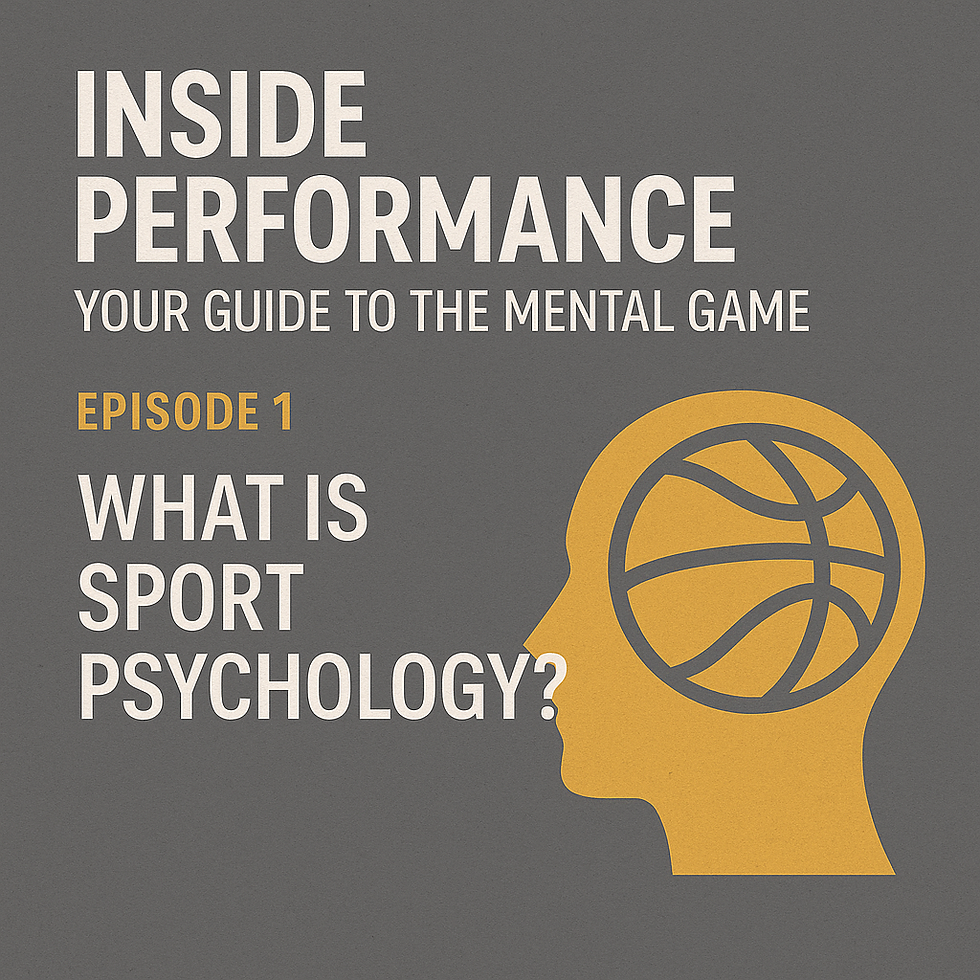🧠 Mastering Your Mind: The Key to Athletic Success
- Dylan Rodgers
- Oct 24, 2025
- 3 min read
Updated: Nov 3, 2025
🧠 Understanding the Mind’s Noise
Our brains are constantly working to predict, plan, and protect. They create thoughts, some true and some not, to make sense of the world.
In sport, that internal voice can be brutal. You might find yourself replaying mistakes, doubting your ability, or focusing on outcomes you can’t control.
Many athletes try to “think positive” or “block out” negative thoughts, but that usually backfires. Why? Because the more we fight with our mind, the louder it gets.
Sport psychology research shows that trying to suppress or control thoughts under pressure often increases anxiety and reduces performance focus. (Gardner & Moore, 2007; Henriksen et al., 2020)
⚙️ The Skill of Cognitive Defusion
Instead of trying to silence your thoughts, a more effective approach is to change your relationship with them. This is known as cognitive defusion, a core process in Acceptance and Commitment Therapy (ACT), an evidence-based model increasingly used in sport psychology.
Defusion means recognising thoughts as what they are, just words, images, or mental events, not facts or commands.
You can’t always choose what thoughts show up, but you can choose how you respond. That’s the difference between being hooked by a thought and observing it.
🏋️♂️ How This Applies to Performance
Imagine you’re about to take a penalty. Your mind whispers, “You’re going to miss.”
Option 1: You believe it. You tense up, overthink, and your focus slips.
Option 2: You notice it — “I’m having the thought that I might miss” and refocus on your breathing, your target, and your routine.
Same thought. Different response. Different outcome.
That’s what psychological flexibility looks like: staying focused on your actions, not trapped by your thoughts.
🧭 Practical Ways to Train It
Like any other skill, this takes practice.
Here are a few simple ways to start training your mind to unhook from unhelpful thoughts:
1. Notice and Name
When a thought shows up, label it:
“I’m having the thought that I’m not good enough.”
That tiny pause helps you step back and observe rather than react.
2. Use Mindful Breathing
Take 30 seconds to focus on your breath. Thoughts will come and go; that’s normal. The goal isn’t to stop them but to notice them passing.
3. Anchor to the Present
Bring your attention to something in your control: your body position, your next action, your effort.
4. Reflect, Don’t Judge
After training or competition, reflect on what thoughts showed up. What did you do next? This builds awareness of patterns and triggers.
⚡️ Why This Matters
Athletes who develop this skill perform with more freedom and resilience. They don’t waste energy trying to silence their mind; they train it.
Research consistently shows that mindfulness and acceptance-based approaches improve focus, confidence, and emotion regulation under pressure (White et al., 2021; Kaufman et al., 2018).
Learning to see thoughts as thoughts doesn’t make you weaker; it makes you in control.
🌟 The Importance of Mental Training
Mental training is as crucial as physical training. Just as athletes work on their strength and endurance, they must also cultivate their mental resilience.
Building a Strong Mental Foundation
A strong mental foundation allows athletes to face challenges head-on. It helps them to remain calm under pressure and to bounce back from setbacks.
Developing Coping Strategies
Coping strategies are essential for managing stress and anxiety. Athletes can benefit from techniques such as visualization, positive affirmations, and goal setting.
The Role of a Coach
A coach can play a vital role in an athlete's mental training. They can provide guidance, support, and feedback. This helps athletes to stay focused and motivated.
💬 Final Thought
Training your mind is no different from training your body; it takes intention, consistency, and guidance.
If you’d like to learn how to train these mental skills and apply them to your sport, that’s exactly what I help athletes do.
📩 Get in touch to start building your mental game.
🔬 References (for readers who like the science)
Gardner, F. & Moore, Z. (2007). The Psychology of Enhancing Human Performance: The Mindfulness-Acceptance-Commitment Approach.
White, R. G. et al. (2021). Acceptance and Commitment Approaches for Athletes’ Wellbeing and Performance.
Henriksen, K. et al. (2020). Mindfulness and Acceptance in Sport: How to Help Athletes Perform and Thrive under Pressure.
Kaufman, K. A., Glass, C. R., & Pineau, T. R. (2018). Mindful Sport Performance Enhancement: Mental Training for Athletes and Coaches.



Comments